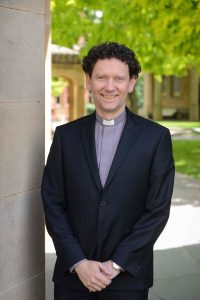 The 15 August was the Feast Day of Mary, Mother of our Lord. Your immediate reaction, if you know anything about churches and their feast days, might be to ask, “Fr Theo, isn’t that more of a Catholic thing, to celebrate Mary?” To which my response would be, “No, it’s more of a Bible thing.” Let’s have a look.
The 15 August was the Feast Day of Mary, Mother of our Lord. Your immediate reaction, if you know anything about churches and their feast days, might be to ask, “Fr Theo, isn’t that more of a Catholic thing, to celebrate Mary?” To which my response would be, “No, it’s more of a Bible thing.” Let’s have a look.
In Luke chapter 1, verse 39–56, Mary has just received the news that she’s going to be a mother. She also knows that her cousin Elizabeth is pregnant, so she heads off to share her good news with her cousin. Elizabeth is excited to hear the news and together the two women celebrate. As part of the celebration, Mary launches into a song of praise to God, celebrating all that God has done and all that God will do through the birth of her son.
We read this now and go, “Well, that’s nice: Mary is proclaiming how God cares for the lowly and the downcast, isn’t that swell! Isn’t it good that Mary tells how God will overthrow the proud and the powerful and the rich and will look after the poor and the lowly?”
We forget how revolutionary this idea was at the time, that God would look after the poor. In Jewish culture, although there was a general belief that you were supposed to look after your Jewish neighbour, especially your family and friends, the basic belief nonetheless was that if you were rich, it was because God had blessed you. You might have an obligation to use your God-given wealth to look after your poor relatives, but the basic belief was that wealth was given by God. To be wealthy was a sign that God had blessed you.
In Luke’s Gospel, as Luke is trying to share the good news of Jesus to the whole world, this idea is turned upside down. God will bless the poor and the downtrodden and the oppressed. And he will send the rich away empty. It’s radical stuff: God’s blessing will come on the poor.
In the Jewish tradition, much like our own tradition until very recently, if you wanted someone to say something important, you had to choose your speaker very carefully. If you wanted something important said, a message from God for example, you would have a venerable old man say it. In his Gospel, Luke has two of these kinds of figures give a message of blessing from God, when they talk about Jesus. He has Zechariah, Elizabeth’s older husband, and he has Simeon, an old man who worships in the Temple. Both these characters talk about how important Jesus is. But who does Luke have speak first? Who does Luke give the place of honour to, the first speaker’s slot? Mary, the young woman.
Who you get to give your message matters almost as much as the message itself, because symbolism is really powerful. That’s why the Taliban soldiers tried to kill Malala Yousafzai. It wasn’t just because she was saying how important girls’ education was, but also because it was a young girl saying it. Luke was doing something equally radical in his Gospel: the message about God loving the poor and the downcast, the message that Jesus’ birth will change the fabric of the world, comes from a young mother. Remember too that Zechariah, Elizabeth’s husband, who speaks second, is listening to Mary say all this. So, she is instructing the old man! The radical thing is that Mary is teaching the male elders. For the Jewish people of the time, this was truly radical stuff.
What would be the radical application of Christianity today? Perhaps it is listening to the likes of Malala talk about girls’ education.
I always listen to my three sisters when it comes to this sort of thing. We all had a very similar experience. In our childhood, it was a no-brainer that men and women would be listened to equally and respected equally. Mum was always respected and my three sisters had every opportunity that was given to my brother and me. When we went out into the world and went our own ways, my sisters had the same experience that I did, which was absolute astonishment that people were talking about women’s rights. I was astonished because my sisters had always been treated equally, so why should women have to fight for that? My sisters were astonished because they discovered that they weren’t always treated equally and sometimes had to fight for it. Really, we should all have listened to Mary in Luke’s Gospel. As a young mother, she is saying, “God will turn your systems of oppression upside down. It’s time to take the message of Jesus seriously.”
The Reverend Dr Theo McCall
School Chaplain
